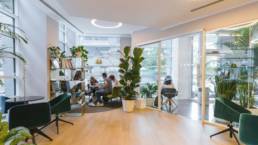Flexible office spaces provide a new and exciting location that can be shared by start ups and larger businesses alike. The use of Flexi spaces has taken off in recent years, creating a whole new way of working with a host of new benefits.

1. Choose the Right Location
The location of your workspace can make or break your productivity. Ideally, select a space that is quiet and free from distractions. If you’re working from home, avoid areas with high foot traffic or noise, like the kitchen or living room. If possible, dedicate a separate room or corner for work to create clear boundaries between work and personal life.
If you’re choosing an office outside the home, consider one near a high street or a bustling location. Being close to shops, cafés, or parks not only offers convenience but can also give you opportunities to take quick breaks, stretch your legs, and recharge, which can boost productivity.

2. Invest in Ergonomic Furniture
Comfort is key to maintaining focus for extended periods. An ergonomic chair and a desk that’s at the right height can help prevent back pain and strain. Consider adding accessories like a laptop stand, an external keyboard, or a footrest to ensure your setup supports good posture.

3. Optimise Lighting
Lighting can influence your energy levels and mood. Natural light is ideal, so position your desk near a window if possible. For darker spaces, use a combination of overhead lighting and a desk lamp with warm or adjustable brightness. Avoid overly harsh lighting, which can cause eye strain, or dim setups that make you feel sleepy.

4. Declutter and Organise
A cluttered desk leads to a cluttered mind. Take time to declutter your workspace regularly. Use organisers, trays, and storage solutions to keep your essentials within reach and minimise distractions. Digital clutter counts too—organise your desktop and email inbox to avoid feeling overwhelmed.

5. Incorporate Personal Touches
Adding a few personal items can make your workspace feel inviting and boost your motivation. Consider items like framed photos, inspirational quotes, or plants. Plants, in particular, can reduce stress and improve air quality, making them a great addition to any workspace.

6. Minimise Distractions
Identify potential distractions in your workspace and address them proactively. For example, use noise-canceling headphones to block out background noise or apps that limit access to distracting websites. If your phone is a distraction, keep it out of reach or on silent mode during focused work sessions.

7. Create a Productivity-Boosting Atmosphere
Experiment with elements that help you focus, such as background music, white noise, or aromatherapy. Scents like lavender or citrus can enhance concentration and reduce stress. Find what works best for you and make it a consistent part of your work routine.
So there you have it. productive work spaces offer many potential benefits, of which we have named just a few! If a flexible work environment sounds like it could be a could fit for you, feel free to pop in for a tour or contact us at hello@otherspace.io today!

